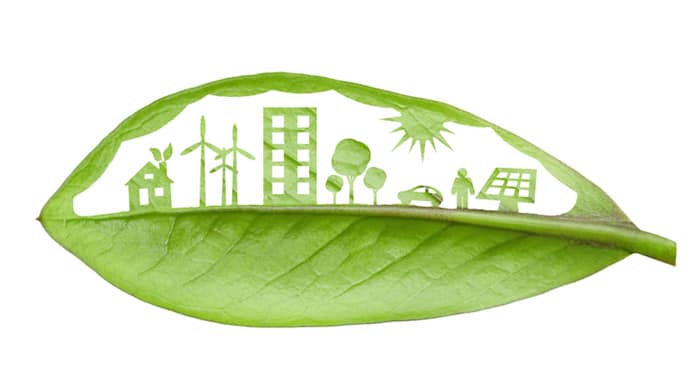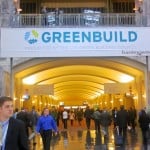Most building materials companies are only as environmentally-friendly, or ‘green,’ as they need to be. Demand for a green product or a perceived competitive advantage may cause them to alter their products.
Many of them feel they can also claim to be green by simply using fancy vocabulary. At the Greenbuild show, I made a list of terms used by building materials manufacturers:
Huh? What do these terms actually mean?
For the most part, I don’t think they mean anything; they just sound nice.
Companies don’t provide any explanation of what the product having ‘healthier ingredients’ or “environmental’ means. Even worse, many companies don’t make any changes to the product to make it green or greener—they just find a way to say it.
Are they saying it or doing it? In my experience, most building materials companies are inconsistent about being green.
Assa Abloy is a great example of this incongruence between words and actions.
If you look at Assa Abloy’s website, they have an excellent story about company sustainability on their homepage. Many other manufacturers also have an obligatory but meaningless statement about their commitment to sustainability on their website, that you have to search for.
Assa Abloy had an impressive exhibit at Greenbuild. The staff at the booth had been well-trained; they could tell you the green story for each of their products and many of these stories were impressive.
The big incongruence came when I noticed a large RV in their booth that functioned as a mobile showroom for their products. First of all, I can’t think of many potential showrooms that are less green than RVs. To environmentally-conscious people, an RV is a very anti-green symbol.
Second, I could not find a single green message on the inside or outside of the RV. All of the messaging was about aesthetics and security.
They also handed out beautiful literature, which is also a very anti-green thing to do as most of it ends up in a hotel trashcan. That put doubts in my mind: is Assa Abloy really green or do they just try to act green when they feel they should?
I don’t mean to pick on Assa Abloy; I’m just using them an example. I actually think they are doing more than the majority of building materials manufacturers. But they need to unify their company’s message if they want to be viewed as a green manufacturer.
How can you become a respected green building materials company?
Take a lesson from chemical companies like Dow. Because they work with dangerous materials, they are very safety-conscious. It’s not just a training class and a slogan; it’s a way of life.
If you ask any Dow employee what the most important company value is, you will very often hear the word ‘safety.’ There is constant and ongoing safety training for everyone. It is so ingrained that it goes beyond the workplace to their personal lives (with topics such as safe driving). And there are consequences to those who don’t follow safe practices. Get in an auto accident, and you could lose your job. That might seem extreme to you, but the bottom line is that Dow doesn’t want careless employees, and being careless in your personal life could mean that you’re sloppy on the job too.
Being committed to safety means it’s an all-encompassing part of the company culture. A green company should be committed to being green the way that Dow is committed to being safe:
- Products should be designed to be environmentally-friendly from the ground-up rather than being reverse-engineered. Everything from ingredients and their sources to production processes, distribution, and product performance should be considered. That’s a lot of chances to make a product a significant environmental impact, and it will convince consumers of your company’s commitment to being green.
- The person in charge of sustainability should be more than a figurehead for PR purposes. They need to have real power and the ability to force change or veto decisions.
- Look for areas that aren’t congruent with being green. What type of cars do the salespeople drive? What is the attitude towards becoming paper-free? How environmentally-friendly are the facilities? This should be part of the company’s story that every employee can share without prompting.
- Take the green message home. Train employees to be more eco-conscious in their personal lives and reward them for it.
- Challenge your suppliers to be greener, monitor their progress, and try to locate even greener suppliers.
Most companies assume that being this eco-conscious just adds cost and will make them less competitive. Most companies aren’t this committed to being green. They are happy to be just green enough.
The first step most companies should take is to look for obvious signs of being incongruent with their message. Think about Assa Abloy. Do you use RVs or other products that eco-friendly people despise? Even small things like being too willing to hand out literature can make a difference.
The green market wants to deal with green companies.
They want green products to be a priority, not an afterthought. They also know being environmentally-friendly is a process and respect the companies that are making a sincere effort. And they can tell when companies are faking it.
If you want to sell to them, stop pretending to be green. Don’t sell ‘green’ products. Be green.
Subscribe To My Newsletter
If you like what I say, sign up for my newsletter here and get my weekly newsletter every Sunday night.
Thanks for the following comments. I’d like to hear your feedback and suggestions on how to sell architects.
“This is a very insightful, thought-provoking article. Consumers aren’t fooled when companies are “green” in word but not in action. The claims have to be backed up to mean anything. Thank you!”
Faith Cook
Marketing Coordinator
Atlas Roofing Corporation
“Thank you for sharing your passionate article. I hope corporate America will embrace your position and accuracy of your statements.”
Tim Whaley
Business Development
Sustainable Matrix











